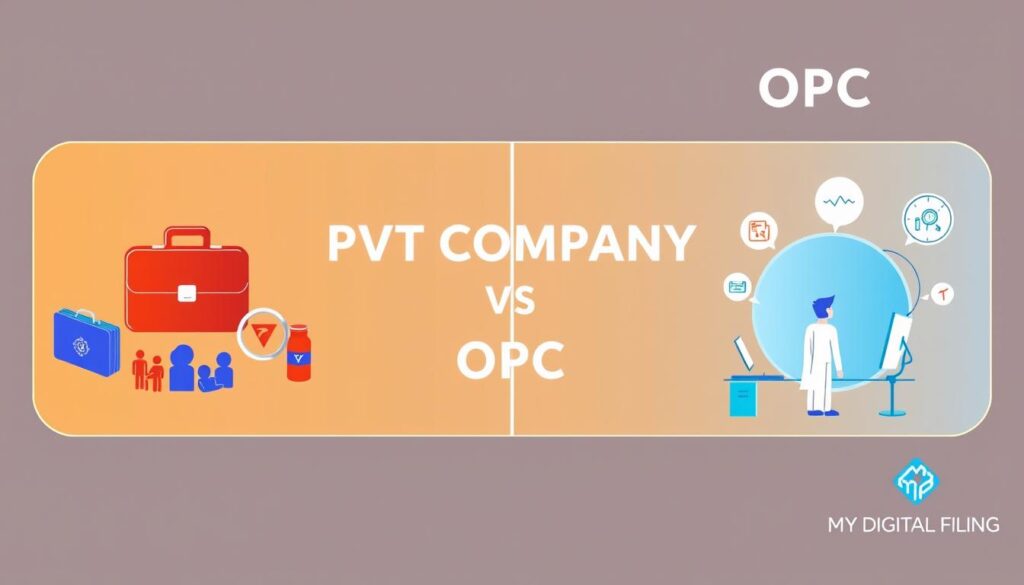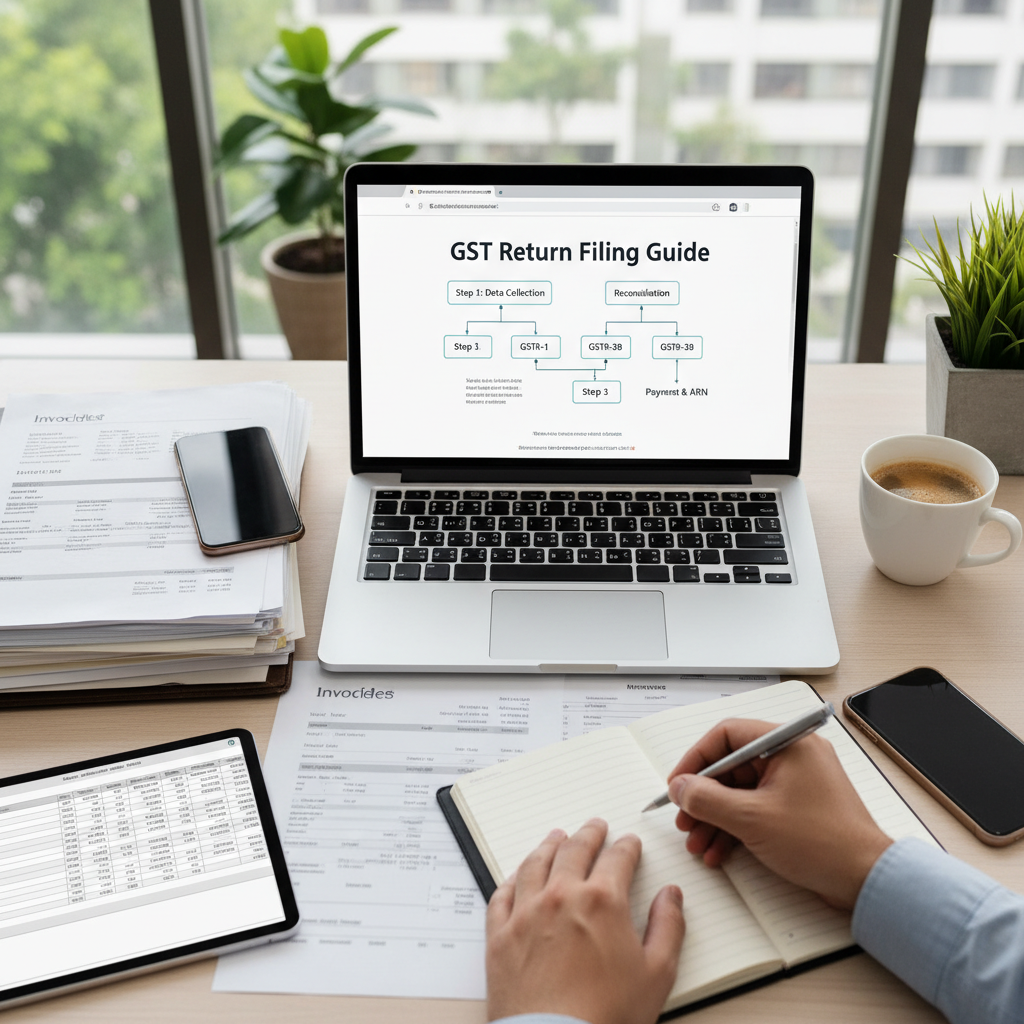Ever thought about the best business structure for your dreams in India? Choosing between a Private Limited Company and a One Person Company (OPC) is crucial. Let’s dive into the main differences to guide your decision.
Understanding the details of company formation is key. The difference between private limited company and OPC is in their setup, flexibility, and rules.
Private Limited Companies need at least two shareholders and can grow to 200. They’re perfect for businesses aiming to grow and attract investors. OPCs, however, are for solo entrepreneurs, offering protection from personal liability.
Both types have their benefits. Private Limited Companies are seen as more credible and can get funding easily. OPCs, on the other hand, have simpler rules and management. Your choice should match your business goals, resources, and future plans.
Key Takeaways
- OPCs allow single-person company formation
- Private Limited Companies can have 2-200 shareholders
- Both provide limited liability protection
- OPCs have fewer compliance requirements
- Private Limited Companies offer more fundraising options
- Choice depends on business scale and goals
Understanding Private Limited Company and OPC
In India, two main types of companies are Private Limited and One Person Companies (OPCs). These structures help entrepreneurs start their businesses. Each has its own benefits.
Definition of Private Limited Company
A Private Limited Company is a common choice in India. It’s a legal entity separate from its owners. This gives them limited liability protection. It can have 2-200 shareholders and follows the Companies Act 2013.
Features of Private Limited Company
Private Limited Companies offer flexible ownership and good management. They can issue shares and have perpetual succession. They are also attractive to investors. These companies must register with the Registrar of Companies (ROC) and can do various business activities.
Definition of One Person Company (OPC)
An OPC is a new concept from the Companies Act 2013. It lets one person start a company with limited liability. It’s great for solo entrepreneurs who want control over their business.
Features of One Person Company (OPC)
OPCs have unique features like single shareholding and a nominee director. They have fewer rules than Private Limited Companies. OPCs can start with just Rs 1 lakh and have some business activity limits.
| Feature | Private Limited Company | One Person Company (OPC) |
|---|---|---|
| Minimum Members | 2 | 1 |
| Maximum Members | 200 | 1 |
| Tax Rate | 30% (inclusive of cess and surcharges) | 30% plus surcharge and cess |
| Meeting Frequency | Every 3 months | Every 6 months |
| Foreign Investment | Eligible | Not eligible |
Both Private Limited Companies and OPCs offer limited liability protection. They also need annual compliance filings. The right choice depends on your business size, goals, and ability to follow rules.
Ownership and Management Structure
Private Limited Companies and One Person Companies (OPCs) have different ways of owning and managing. It’s key for entrepreneurs to know these differences when picking a business model.
Number of Shareholders
Private Limited Companies need at least two shareholders and can have up to 200. This lets for many different ways of owning the company. OPCs, however, have only one shareholder. This person has full control over the business.
Nominee Director in OPC
OPCs must have a nominee director ready to take over if the single shareholder can’t. This helps keep the business running and solves problems of who will take over. The nominee’s job is very important in keeping things going when unexpected things happen.
Board of Directors in Private Limited Company
Private Limited Companies need at least two directors. This setup means more people can help make decisions. The board’s makeup can really shape the company’s future and how it’s run.
| Aspect | Private Limited Company | One Person Company |
|---|---|---|
| Shareholders | 2-200 | 1 |
| Directors | Minimum 2 | 1 (with nominee) |
| Decision Making | Board consensus | Single owner |
| Capital Raising | Can issue shares | Limited options |
Choosing between a Private Limited Company and an OPC depends on your business goals and how much control you want. Think about these things carefully to pick the best structure for your business.
Limited Liability Protection
Private Limited Companies and One Person Companies (OPCs) provide strong legal protection for personal assets. These structures keep your personal wealth safe from business debts and legal issues. Your risk is only as much as your investment in the company.
In India, the Companies Act 2013 sets the rules for this protection. This is a big reason to pick between different business setups. Let’s look at how Private Limited Companies and OPCs protect your assets:
| Aspect | Private Limited Company | One Person Company (OPC) |
|---|---|---|
| Shareholders | 2-200 | 1 |
| Personal Asset Protection | Yes | Yes |
| Liability Limit | Investment amount | Investment amount |
| Legal Entity Status | Separate from owners | Separate from owner |
Both setups create a wall between your personal and business assets. This makes starting a business less risky. You can explore business ideas without worrying about losing your personal money.
Limited liability protection is a cornerstone of modern business law, enabling entrepreneurs to take calculated risks.
Even with this protection, it’s not foolproof. You must keep your business and personal finances separate. This way, you can keep the protection in place.
Compliance Requirements
Understanding statutory regulations in India can be tough for businesses. Both Private Limited Companies and One Person Companies (OPCs) have to follow certain compliance requirements. Let’s look at the main differences in their rules.
Statutory Compliances for Private Limited Company
Private Limited Companies have stricter rules. They must hold regular board meetings and file annual returns. They also need to conduct audits. Compliance costs are higher for these companies because of their complex setup.
Statutory Compliances for One Person Company
OPCs have fewer rules, making them simpler for solo entrepreneurs. They only need one director and one shareholder. But, OPCs still have to follow some rules:
- Appoint an auditor within 30 days of starting
- File a declaration for starting business within 180 days
- Submit annual returns within 60-180 days to the Registrar of Companies
| Compliance Aspect | Private Limited Company | One Person Company |
|---|---|---|
| Board Meetings | Minimum 4 per year | No specific requirement |
| Annual General Meeting | Mandatory | Not required |
| Director KYC | Required annually | Required annually |
| Auditor Appointment | At first AGM | Within 30 days of incorporation |
Both types must follow the Companies Act 2013 and register with the Ministry of Corporate Affairs. OPCs have simpler rules, but Private Limited Companies offer more growth and investment chances.
“Compliance is not just about following rules; it’s about building trust and credibility in the business ecosystem.”
Credibility and Perception
Choosing between a Private Limited Company and a One Person Company (OPC) affects your business’s image. Both have benefits for investor trust and client confidence.
Investor and Client Perception
Private Limited Companies are often seen as more credible. They have many shareholders and a board, making them stable and trustworthy. This is great for attracting investments or partnerships.
OPCs, though newer, also offer limited liability and a formal structure. This makes them stand out more than sole proprietorships.
Credibility in the Market
Your business’s image can greatly affect its success. Private Limited Companies are often viewed as more credible. This is good for working with big clients or financial institutions.
But, OPCs are becoming more popular. They offer a simple structure and protection for personal assets. This makes them appealing for startups and small businesses.
| Factor | Private Limited Company | One Person Company |
|---|---|---|
| Investor Appeal | High | Limited |
| Client Trust | Strong | Growing |
| Financial Institution Perception | Very Positive | Positive |
| Market Reputation | Well-established | Emerging |
Private Limited Companies might have more credibility. But OPCs are a good choice for those wanting a formal business with asset protection. Your choice should match your business goals and what your market expects.
Succession and Transfer of Ownership
Passing on your business is different for Private Limited Companies and One Person Companies (OPCs). Let’s explore how each handles ownership changes.
Transfer of Shares in Private Limited Company
In a Private Limited Company, you can easily transfer ownership by selling shares. This makes it easy to change who owns the company. The company can also update its rules to make transferring shares smoother. This is good for growing your business or attracting new investors.
Nominee Succession in One Person Company
OPCs have a special way to handle succession. The owner picks a nominee who takes over if they can’t manage the business anymore. This keeps the company going even if the owner can’t. But, it limits how you can change who owns the company.
| Aspect | Private Limited Company | One Person Company |
|---|---|---|
| Ownership Transfer | Easy through share transfer | Limited to nominee succession |
| Number of Shareholders | 2-200 | 1 |
| Foreign Ownership | Allowed (subject to FDI guidelines) | Not allowed |
| Fundraising Options | Multiple avenues | Limited due to single member |
Directors have different roles in these companies. In Private Limited Companies, directors work together. In OPCs, the single member-director makes all decisions. This affects how fast you can change ownership or bring in new ideas.
Taxation Aspects
Choosing between a Private Limited Company and a One Person Company (OPC) means understanding taxes is key. Both have their own tax rules that can affect your business’s money health.
Corporate Tax Rates
In India, Private Limited Companies and OPCs face the same corporate tax rate. The basic rate is 22%, without surcharge or cess. This makes it fair for all businesses, no matter their structure.
| Entity Type | Basic Tax Rate | Surcharge | Cess |
|---|---|---|---|
| Private Limited Company | 22% | 7% (income > ₹1 crore) | 4% |
| One Person Company | 22% | 7% (income > ₹1 crore) | 4% |
Tax Planning Opportunities
Even though tax rates are the same, there are different tax planning chances for Private Limited Companies and OPCs. Private Limited Companies can use their complex setup to plan taxes better. They can use many shareholders and directors to find the best tax strategies.
OPCs, being simpler, might have fewer tax planning options. But, they have less paperwork, which can lower their tax burden. Your choice should think about both taxes now and your future financial plans.
Good tax planning is more than just looking at tax rates. It’s about knowing your business, its growth, and your finances well. Talking to a tax expert can help you understand the tax details for both Private Limited Companies and OPCs.
Ease of Establishment
Setting up a business in India can be different for Private Limited Companies and One Person Companies (OPCs). OPCs are simpler for solo entrepreneurs to start.
OPCs need only one promoter at the start. This makes the beginning easier. Private Limited Companies, however, need at least two shareholders. This adds complexity.
Both types use the SPICe+ form for registration. But, there are key differences:
| Aspect | OPC | Private Limited Company |
|---|---|---|
| Minimum People Required | 1 (Director/Shareholder) | 2 (Directors and Shareholders) |
| Foreign Directors | Not Allowed | Allowed |
| Mandatory Board Meetings | 2 per year | 4 per year |
| Statutory Audit | Mandatory | Mandatory |
To register, you need a Digital Signature Certificate and a company name. OPCs have fewer initial steps. This can make starting your business faster.
Think about your future goals when deciding. OPCs are quicker to start. But, Private Limited Companies are better for growing and attracting investors.
Operational Flexibility
When deciding between One Person Companies (OPCs) and Private Limited Companies, operational flexibility is key. Let’s look at how these two differ in director responsibilities and flexibility.
Decision Making Process
OPCs make decisions quickly because they have only one owner. The sole director can act fast without needing many discussions. Private Limited Companies, however, need board meetings and shareholder votes for big decisions. This makes their decision-making process more complex but balanced.
Flexibility in Business Operations
OPCs are more flexible in their operations. They only need to hold two board meetings a year. Private Limited Companies must have at least four. This affects how easily directors can make decisions and the company’s agility.
| Aspect | One Person Company | Private Limited Company |
|---|---|---|
| Decision Making | Quick, single-person decisions | Board and shareholder approvals required |
| Board Meetings | Minimum 2 per year | Minimum 4 per year |
| Fundraising Options | Limited | More diverse, including ESOPs |
Private Limited Companies can raise funds in more ways. They can use Employee Stock Ownership Plans (ESOPs) and other methods. OPCs can’t do this. This is important for growing fast or attracting the best employees.
Choosing between an OPC and a Private Limited Company depends on your goals. Think about your long-term plans and the trade-offs. Consider how quick decisions and various funding options fit into your business vision.
Difference Between Private Limited Company and OPC
Choosing between a private limited company and an OPC is key for your business in India. Each has its own benefits and features that can shape your business’s future.
Key Distinguishing Factors
Private Limited Companies need at least two shareholders and directors. OPCs, however, can have just one member. OPCs must have a nominee director, while Private Limited Companies have more freedom in their board.
Private Limited Companies are more complex but offer better chances for growth and raising funds.
Comparative Table: Private Limited Company vs OPC
| Aspect | Private Limited Company | One Person Company (OPC) |
|---|---|---|
| Minimum Members | 2 | 1 |
| Maximum Members | 200 | 1 |
| Directors | Minimum 2 | 1 (with nominee) |
| Name Suffix | “Private Limited” | “OPC Private Limited” |
| Foreign Investment | Eligible | Not eligible |
Private Limited Companies offer more freedom in ownership and management. They can have up to 200 shareholders and welcome foreign investment. OPCs, however, are simpler for solo entrepreneurs but limit growth and fundraising.
When deciding between a private limited company and an OPC, think about your business goals. Private Limited Companies are great for fast-growing businesses with diverse ownership. OPCs are best for solo entrepreneurs who value simplicity and compliance.
Factors to Consider When Choosing Between Private Limited Company and OPC
Deciding between a pvt company and OPC depends on several factors. Let’s look at key points to help you choose wisely.
Nature and Scale of Business
The size of your business matters a lot. OPCs are great for small businesses, while private limited companies are better for bigger ones. If your business has more than fifty lakh rupees in paid-up capital or an average annual turnover of over two crore rupees, you’ll need to change to a private company.
Long-term Goals and Growth Plans
Think about your business’s future. Can an OPC become a private company? Yes, it can. As your business grows, you might need to switch to a private limited company. This change opens up more ways to raise money and get equity-based funding.
Compliance Capabilities and Resources
Check if you can handle the rules and regulations. OPCs have fewer rules than private limited companies. But, both types need to follow certain laws and rules.
| Factor | Private Limited Company | One Person Company (OPC) |
|---|---|---|
| Minimum Members | 2 | 1 |
| Maximum Members | 200 | 1 |
| Capital Raising | Easier | Limited |
| Compliance Level | Higher | Lower |
| Growth Potential | Higher | Limited |
Can a pvt company become an OPC? It’s possible, but only if certain conditions are met. These include having paid-up share capital not over fifty lakh rupees and an average annual turnover below two crore rupees at the time of change.
“Choose a business structure that fits your current needs and future goals. It’s not just about what’s better now, but what will serve you best in the long run.”
Conclusion
The choice between a private limited company and an OPC (One Person Company) is key for entrepreneurs in India. Private limited companies need at least two shareholders and directors. OPCs, however, can start with just one person.
This difference affects many parts of running a business and following rules. Private limited companies can grow bigger and get more money. They also don’t have limits on how much money they can make or spend.
OPCs, though, have limits. They can only have Rs. 50 Lakhs in share capital and make up to Rs. 2 crores a year. Companies like American Express (India) Private Limited show how private limited companies can grow. Durga Cotton Private Limited (OPC) in Mumbai is an example of an OPC.
Think about your business goals when choosing. Private limited companies are good for fast growth and getting money from many sources. OPCs are simpler and cheaper, perfect for solo entrepreneurs or small businesses. Your choice should match your business plans and ability to follow rules.
FAQ
Q: What is the difference between a Private Limited Company and an One Person Company (OPC)?
A: A Private Limited Company (PLC) needs at least two shareholders and can have up to 200. An OPC is for one entrepreneur. PLCs need more rules but offer more credibility and ways to raise money.
Q: How does the ownership structure differ between PLCs and OPCs?
A: PLCs need two shareholders and can have up to 200. OPCs have one shareholder who owns everything. OPCs must pick a nominee director for when the owner can’t manage.
Q: Do both PLCs and OPCs offer limited liability protection?
A: Yes, both PLCs and OPCs protect their shareholders’ personal assets. This means their personal stuff is safe from the company’s problems.
Q: What are the compliance requirements for PLCs and OPCs?
A: PLCs have strict rules, like regular meetings and audits. OPCs are easier to manage for one person. Both must follow the Companies Act 2013 and register with the Ministry of Corporate Affairs.
Q: How are PLCs and OPCs perceived in terms of credibility?
A: PLCs are seen as more reliable by investors and clients because of their structure. OPCs might face doubt at first but still get the benefits of being a company.
Q: How does the transfer of ownership work in PLCs and OPCs?
A: In PLCs, selling shares is easy. But in OPCs, the nominee takes over if the owner can’t manage anymore.
Q: Are there any differences in taxation between PLCs and OPCs?
A: Both are taxed the same in India. But, tax planning can differ based on the business. PLCs might have more options because of their structure.
Q: Which entity type is easier to establish, PLC or OPC?
A: OPCs are quicker to start than PLCs. You only need one person for an OPC. Both use the SPICe+ form for registration.
Q: How does operational flexibility differ between PLCs and OPCs?
A: OPCs are more flexible because of single ownership. PLCs need more approvals for big decisions.
Q: Can an OPC convert to a Private Limited Company?
A: Yes, OPCs can change to PLCs as they grow. This is needed if they make more than Rs. 2 Crores or have more than Rs. 50 lakhs in capital.
Q: What factors should be considered when choosing between a PLC and an OPC?
A: Think about your business size, money needs, and growth plans. OPCs are good for small businesses. PLCs are better for bigger ones.
Please Rate this post
Click to rate











